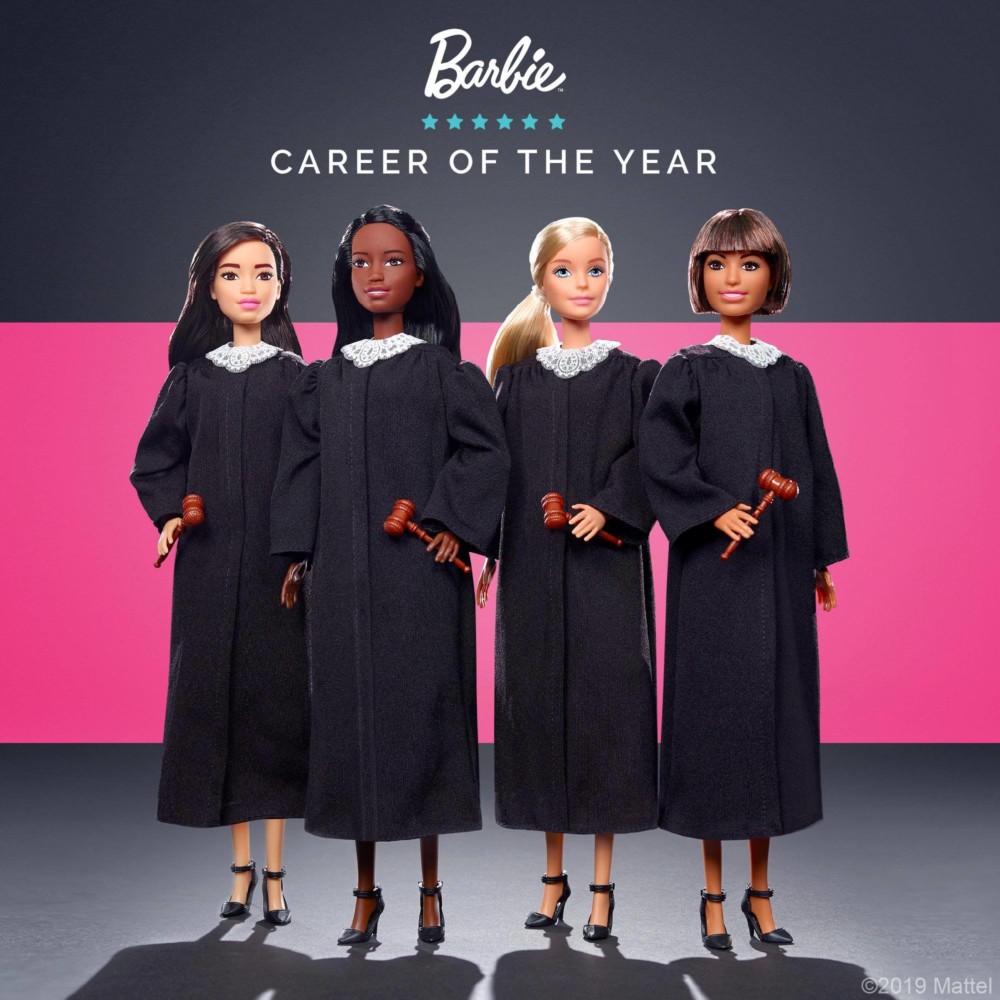By Jennifer Emily
The Dallas Morning News
WWR Article Summary (tl;dr) The new “Judge Barbie” is a hit in the city of Dallas where there are more women now serving on the bench than men!
DALLAS
All rise for Judge Barbie.
Judges in Dallas, where women on the bench outnumber their male counterparts, have snapped up the dolls for themselves, other judges and their kids and grandkids.
The doll, released this fall by Mattel, stirs up memories of childhood but also makes judges wish they had Judge Barbie when they were kids.
It comes in four skin tones, making it easier for children, and judges, to pick out the doll who looks most like them.
“Not only does this Barbie change the narrative for little black girls, it does the same for those of all races,” Dallas County criminal court Judge Shequitta Kelly.
Kelly, 42, loved playing with Barbies as a girl. But she never saw herself in Barbie. The dolls were an escape from real life.
Kelly was 5 when her father was murdered, and she was raised by a single mom. She always planned to go to college. But that goal became harder after she got pregnant in high school.
Kelly, holding a black Judge Barbie that looks like it was molded in her image, said she sees herself in this Barbie. Little girls will see themselves in the doll, too, she said.
“It tells a new story on what has been stereotypically implanted into all of our minds,” Kelly said. “It sets new beliefs and classifies old accepted thoughts as irrational. Judges no longer look like what society defined for us to see and believe.”
Kelly, a Democrat who took the bench in 2015, was the first in her family to go to college. She was an honor roll student in high school, but a guidance counselor told her college was impossible with a baby and suggested beauty school instead. A favorite teacher, though, encouraged Kelly to pursue her dreams of law school.
As a judge, she and three other black female judges, created Pipeline to Possibilities, a program to educate kids about the criminal justice system and inspire them to become leaders.
Nationally, women make up 34% of a state court judges sitting on the bench this year, according to the National Association of Women Judges, which helped design Judge Barbie. That’s up from 25% in 2008.
In Texas, just 31% of all judges are women. But in Dallas County, women represent a far higher percentage of the judiciary. For example, in the county’s criminal courthouse, all but five of the 30 elected judges are women. Most of the judges are also people of color.
That’s nothing like what the courts looked like in Dallas when Lana Myers took the bench nearly 25 years ago. Myers, a Republican on the 5th Court of Appeals in Dallas, was then just one of a handful of female judges when she became a Dallas County felony court judge.
Today, Myers is one of five women on the 13-justice appellate court that hears civil and criminal appeals from Collin, Dallas, Grayson, Hunt and Rockwall counties..
Myers, 65, said she isn’t sure why North Texas voters put so many women on the bench.
“I have always been told by those who study the numbers that a woman has a better chance than a male of being elected,” she said. “I never felt like it hurt me to be a woman running for office.”
Myers didn’t always dream of being a judge. She recalled sitting with her father in the living room of her parents’ home in Irving in 1981 after she graduated from law school at Baylor University. Myers was an intern at the Dallas County district attorney’s office and was studying to pass the bar exam.
Her father pointed to a photo in The Dallas Morning News of a Gerry Holden Meier, a woman who’d just been appointed to a Dallas County felony court bench.
“You can do that,” her father told her.
“That made an impression on me,” she said sitting at her desk decades later, holding Judge Barbie, who is blond like Myers.
Myers, who played with Barbies as a child, keeps Judge Barbie on a table in her chambers next to a photo of young female lawyers she’s mentored. She also gave dolls to her granddaughters, 3-year-old Lucy and 2-year-old Daphne.
She wanted to show them they can be a judge just like Nana.
“It’s so wonderful little girls can play with a doll that tells them, ‘You, too, can be a judge,'” she said. “It’s something attainable.”
For now, though, the girls mainly like taking off and putting on Barbie’s black, strappy high heels.
___
The back of the Barbie package lays out what a judge does and tells girls they, too, can sit on the bench and make rulings.
“Judges are experts in the legal system,” the box says.
“They make important decisions in the courtroom & protect the rights of others.”
“Some rulings can even have a broad impact on society & our everyday lives.”
“Do you like to be just and truthful? You can be a judge!”
The dolls retail for around $13 but are out of stock in most places. They can be bought on the secondhand market, but the price and shipping is much higher. Kelly plans to buy another for herself and many more as gifts for little girls once they’re available again. She plans to autograph the packages and write a note telling girls to “dream big.”
Each Judge Barbie comes in a black robe, with a gavel and a white collar like the ones made famous by U.S. Supreme Court Justice Ruth Bader Ginsburg. The justice is the second woman to sit on the nation’s highest court and has found pop culture fame outside the court where she’s sometimes referred to as the Notorious RBG.
Other judges have taken to wearing similar collars. Kelly’s is made out of white beads. She and other judges call the adornments their “Ruth collars.”
Myers said she’s trying to figure out how to make a small strand of pearls for her Barbie, a gift from another justice on the court. Myers always wears a strand of pearls in two loops around her neck when she wears her robe.
She could ask criminal court Judge Angela King for advice.
King, 50, created a Barbie-size courtroom for her doll. The seal of Texas hangs on the wall over Barbie’s bench, just like in real Texas courtrooms, except this one was trimmed from King’s business card. Once she and her husband create a case for the courtroom, King plans to display it in her chambers.
The judge has long been a fan of Barbies. She played with the dolls until she was 15 when she gave them to her younger sisters. She has two Judge Barbies, one in the box and one she opened for her courtroom display.
She said that she was just one of four black female judges when she took office in 2007. She was part of the “blue wave” of Democrats that swept the courthouse elections. Now, just in the misdemeanor courts where she serves, eight of the 11 judges are black women.
Back then, she told her mom that she wished Mattel made a Judge Barbie. That would have made her dream seem more attainable.
“If I would have had that doll to play with as a girl, oh my gosh,” King said. “That one, I never would have turned over to my sisters.”
King dreamed of becoming a judge since she was a little girl, even though she didn’t see a lot of female lawyers or judges. The ones she did see on television were white.
She found inspiration in reruns of the TV show “Perry Mason.” She’d wake up when her father came home from his job working nights for General Motors. She’d sit with him while he ate dinner and then they’d watch reruns of the legal drama featuring the famed fictional lawyer and his right-hand woman, Della Street. It wasn’t until years later that King found out that Della was Mason’s legal secretary, not a lawyer.
“That’s how I fell in love with the law,” King said. Her father “always said Della was the smartest person on the show.”
So, King set out to be Della Street in real life. But as a lawyer and then a judge.
“I grew up in the era of ‘girls don’t do that. Boys do that,'” said King. “I was always: ‘Don’t tell me girls can’t do that. I’ll show you we can and we can do it better.'”
___
Distributed by Tribune Content Agency, LLC.

















































































































































































































































































































































































